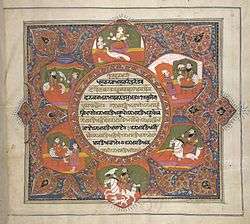Chandi Charitar II
| Dasam Granth Dasam Granth - (ਦਸਮ ਗ੍ਰੰਥ ਸਾਹਿਬ)
|
| Banis |
| Jaap Sahib - Akal Ustat - Bachitar Natak - Chandi Charitar Ukat(i) Bilas - Chandi Charitar 2 - Chandi di Var - Gyan Parbodh - Chobis Avatar - Brahm Avtar - Rudar Avtar - Sabad patshahi 10 - 33 Swaiyey - Khalsa Mahima - Shastar Nam Mala - Charitropakhyan - Zafarnamah - Hikayats |
| Other Related Banis |
| Ugardanti - Bhagauti Astotar - Sri Kaal Chopai - Lakhi Jungle Khalsa - Asfotak Kabits - Sahansar Sukhmana - Vaar Malkauns Ki - Chandd - Chaupai Sahib - Tavparsadi Savaiye |
| History |
| Historical sources - Memorials |
| Various aspects |
| Idolatry Prohibtion |
Chandi Charitar II(Punjabi: ਚੰਡੀ ਚਰਿਤ੍ਰ (ਭਾਗ ੨), also called Chandi Charitar Part 2 is a heroic poetic composition, included as 5th chapter of Dasam Granth, whose authorship is generally and traditionally attributed to Guru Gobind Singh.[1][2] This composition was written in Braj Language at Anandpur Sahib, Punjab
British historically have defiled Banis, and Max Arthur may be one more instance. Acc to Max Arthur Macauliffe, the language of this composition is not original Sanskrit. Just like Var Sri Bhagauti Ji Ki, this composition does not have Bhagauti word. He believes it to be written by bards in employ of Guru Gobind Singh and translation of Durga Saptashati. But as per him, he could not ascertain, whether principles of Sikhism imbibed in Chandi Charitras or flavor of Hinduism is still in it.[3]
Overview
Chandi Charitar II composition has eight cantos, contains 262 couplets and quatrains, mostly employing Bhujang prayat and Rasaval measures.[4] This work was composed at Anandpur Sahib, sometime before AD 1698, the year when the Bachitar Natak was completed. The Compositions contains following chapters
- Chapter 1 - Story of Killing of Mahishasura
- Chapter 2 - Story of Killing of Dhumar Nain
- Chapter 3 - Story of Killing of Chand Mund
- Chapter 4 - Story of Killing of Rakat Beej
- Chapter 5 - Story of Killing of Nishumbh
- Chapter 6 - Story of Killing of Shumbh
- Chapter 7 - The Glories of Chandi - The Giver
- Chapter 8 - The Glory of Holy Composition i.e. Chandi Charitar 2
The poetic meters used in Composition are Sortha, Sangit Naraj, Sangit Bhujang Paryat, Sangit Madhubar, Kulka, Chaupai, Totak, Dohra, Naraj, Bijai, Beli Bidrum, Bridh Naraj, Bhujang Prayat, Madhubhar, Manohar, Rasaval, Ruamal and Rual. It is believed to be translation of Devi Bhagwat Granth, though there is no internal evidence support this fact.
References
- ↑ Dasam Granth - An Introductory Study
- ↑ Sri Dasam.org - Website contain whole text of dasam granth
- ↑ Macauliffe, Max Arthur (Mar 28, 2013). The Sikh Religion: Its Gurus, Sacred Writings and Authors, Volume 5. Cambridge University Press. pp. 80, 81.
- ↑ The Poetry of Dasam Granth - Dharam Pal Ashta Archived August 8, 2011, at the Wayback Machine.
